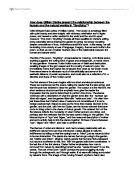How does Raleigh use literal and linguistic devices to mirror and subvert Marlowe's poem
How does Raleigh use literal and linguistic devices to mirror and subvert Marlowe’s poem?
The poem ‘The Passionate Shepherd to His Love,’ was written in 1599 by Christopher Marlowe, and was seen by many as being uncharacteristically naïve from the playwright who created the extremely popular play ‘the Jew of Malta,’ a story of a rich man, rejected by society and tempted into a vengeful killing spree. Although later poems by Marlowe included the similarly naïve poem ‘Come Live with me and be my Love,’ the passionate shepherd prompted a poetic response from poet Sir Walter Raleigh entitled ‘The Nymph’s Reply.’ The Nymph’s Reply utilises a variety of techniques which allow him to parody and undermine Marlowe’s ideas of an Edenic life and perfect love.
The poem takes the form of a reply to the suggestions made by the shepherd of Marlowe’s poem and balking his ideas of love as a perfect and free thing. The original poem by Marlowe uses a number of metaphors based on a natural theme and using a natural lexis, for example a ‘cap of flowers,’ or ‘birds sing madrigals.’ The nymph takes these natural images which the shepherd uses to create a positive image and creates a mirror image, creating negative natural images from his positive ones. As the shepherd claims ‘we will sit upon the rocks,’ Raleigh’s nymph claims ‘rocks grow cold,’ connoting death and the temporary nature of his claims. Once again the contrasting images in the two poems, from the ‘shallow rivers,’ of Marlowe to the ‘raging,’ ones of Raleigh create an effective parody of Marlowe by showing that the gentleness of nature is only temporary. The temporary nature of the shepherd’s ideas of love is a clear focus for the more cynical Raleigh, who creates another natural image in the line ‘In Folly ripe, in reason rotten,’ where the word rotten and ripe create an image of fruit, which has a temporary usefulness and beauty before it becomes ‘rotten,’ as does love. The temporality of love in Raleigh’s eyes is further demonstrated by using words such as ‘fade,’ ‘winter,’ ‘gall,’ and ‘sorrow,’ which all have connotations of decay and death, which obviously signifies the temporary nature of life and love. Raleigh shows his distain for Marlowe’s ideals by using juxtaposition in the third stanza, speaking of a ‘honey tongue, a heart of gall.’ This shows that whilst she believes the idea of love is superficially pleasant there is a rotten undercurrent that taints the idea. The disdainful air is carried through to the next stanza, where constant repetitions of the possessive pronoun ‘thy,’ show that the nymph has no desire for these things and that they are laughable and useless. Alliteration in the poem is also used to create a contrast to Marlowe. ‘Flocks from field to fold,’ and ‘rivers rage and rocks grow cold,’ create a sharp, hard edge to the feel of the poem and this contrasts with the soft, gentleness of Marlowe’s poem







